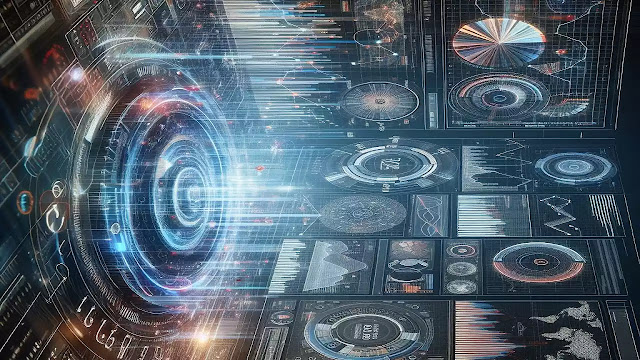Biology and Tech: A Revolutionary Fusion Shaping the World of Science
Introduction - The Fascinating Convergence of Biology and Technology
In today's rapidly evolving world, the boundaries between biology and technology are blurring like never before. The progressive fusion of these seemingly distinct fields is giving birth to groundbreaking innovations that hold immense promise for the future of science and the betterment of our lives.
 |
| Biology and Tech |
Through harnessing the potential of technology, we are unlocking the secrets of biological systems, unraveling the mysteries of life, and revolutionizing key sectors such as healthcare, genetics, and research. This blog post delves into the enthralling domain of biology and tech, exploring the advancements, impacts, and ethical considerations that come with this synergistic relationship.
The Advancements in Biotechnology
Genetic Engineering: Pioneering New Frontiers
One of the most captivating developments in the intersection of biology and tech is genetic engineering. By manipulating the DNA of organisms, scientists are now able to introduce desirable traits, eradicate genetic diseases, and even create entirely novel organisms. Genetic engineering has found applications in agriculture, medicine, and environmental conservation, offering a wide array of possibilities. From genetically modified crops that resist pests to gene therapies that combat life-threatening illnesses, the impact of genetic engineering is monumental.
Bioinformatics: Decoding the Language of Life
Bioinformatics, a hybrid discipline that combines biology, computer science, and mathematics, has become indispensable in the era of big data. With the massive influx of genomic data, bioinformatics plays a crucial role in analyzing, interpreting, and extracting meaningful insights from these complex biological datasets. It aids in understanding the interactions between genes, proteins, and other molecules, unraveling the intricate mechanisms governing life. By leveraging bioinformatics, scientists can accelerate research efforts, identify disease biomarkers, and develop targeted therapies.
Medical Technology: Transforming Healthcare
The convergence of biology and technology has dramatically transformed the healthcare landscape. Innovative medical technologies, powered by cutting-edge techniques, now enable early disease detection, precise diagnoses, and customized treatment plans. From advanced imaging technologies like MRI and CT scans to minimally invasive robotic surgeries, these developments have significantly improved patient outcomes, reducing pain, enhancing accuracy, and expediting recovery. Furthermore, wearable devices and health monitoring apps empower individuals to take control of their well-being, contributing to preventative care and better management of chronic conditions.
The Impact of Artificial Intelligence on Biology
- Machine Learning in Genomics
Artificial intelligence (AI), particularly machine learning, has emerged as a game-changer in genomics. By analyzing vast genomic datasets, machine learning algorithms can unveil patterns, identify disease risk factors, and predict treatment responses. This enables scientists to develop personalized treatment plans, improve disease prognosis, and guide drug discovery efforts. The integration of AI and genomics allows us to comprehend the genetic underpinnings of diseases, paving the way for precision medicine and targeted interventions.
- AI in Drug Discovery
The traditional drug discovery process is often time-consuming, expensive, and uncertain. However, the introduction of AI has revolutionized this field, expediting the search for new therapeutic molecules. By leveraging AI algorithms, scientists can rapidly screen large compound libraries, predicting their efficacy and safety profiles. This speeds up the identification of potential drug candidates, optimizing the development process. Additionally, AI models aid in predicting the off-target effects of drugs, minimizing risks and ensuring patient safety.
- Precision Medicine and AI-driven Diagnosis
Precision medicine, an approach that tailors medical interventions based on an individual's unique genes, environment, and lifestyle, has gained substantial momentum with the help of AI. Machine learning algorithms can analyze vast patient datasets, genotype information, and clinical records to guide treatment decisions. These AI-driven diagnostic tools assist in the early detection of diseases, risk assessment, and predicting disease progression. By harnessing the power of AI, healthcare providers can optimize patient care, improve treatment outcomes, and reduce healthcare costs.
Robotics in Biology: Enabling Groundbreaking Research and Exploration
Biobots: Merging Biological Systems with Robotics
The emergence of biobots, also known as biohybrid robots, has opened up new avenues for scientific exploration and research. These remarkable creations blend biological components, such as living cells or tissues, with robotic frameworks, enabling unprecedented capabilities. Biobots have demonstrated potential applications in drug screening, targeted drug delivery, and tissue regeneration. By mimicking natural systems and employing the advantages of robotics, researchers can delve into intricate biological processes, expanding our knowledge and propelling innovation.
Swarm Robotics for Environmental Monitoring
In the realm of biology and tech, swarm robotics offers a unique perspective to environmental monitoring. Inspired by the collective behavior of social insects, swarm robotics involves groups of small, autonomous robots collaborating to accomplish complex tasks. In the context of environmental monitoring, these robots can navigate challenging terrains, gather vital data, and share information amongst themselves. Swarm robotics provides a cost-effective and efficient approach to monitor ecosystems, study endangered species, and aid in disaster response.
Ethical Considerations and Future Perspectives
Balancing Technological Progress with Ethical Boundaries
As the amalgamation of biology and technology continues to advance, it is imperative to address ethical considerations and strike a balance between progress and ethical boundaries. Deliberations about issues such as genetic manipulation, data privacy, and the impact of AI on employment require careful thought and regulation. By fostering open dialogues, involving stakeholders from multiple disciplines, and ensuring transparency, we can navigate these ethical dilemmas and shape a future where biology and tech coexist harmoniously for the betterment of humanity.
The Promising and Challenging Future of Biology and Tech
The future of biology and tech holds immense promise, heralding a new era of scientific discovery and innovation. From advancements in genetic engineering and bioinformatics to the integration of AI and robotics, the possibilities are endless. However, challenges also lie ahead. Overcoming technical barriers, addressing ethical concerns, and bridging gaps in interdisciplinary collaborations are crucial for harnessing the full potential of this fusion. While the future may hold uncertainties, the combined power of biology and tech offers hope for conquering pressing global challenges, transforming healthcare, and unraveling the mysteries of life.
Conclusion - A Harmonious Blend Driving Scientific Progress
In conclusion, the convergence of biology and technology has emerged as a catalyst for scientific progress. The seamless integration of biology's intricate systems with the cutting-edge tools of technology has revolutionized fields such as biotechnology, genomics, medicine, and research. Genetic engineering, bioinformatics, and medical technology have transformed healthcare, offering personalized treatments and enhanced patient care. Meanwhile, the impact of AI in genomics, drug discovery, and precision medicine has unlocked new possibilities in disease understanding and intervention. Additionally, the introduction of robotics, from biobots to swarm robotics, has opened up avenues for groundbreaking research and exploration. While navigating ethical considerations, the harmonious blend of biology and tech holds the potential to shape a future where scientific advancements are driven by the relentless pursuit of knowledge, innovation, and the betterment of humanity.






